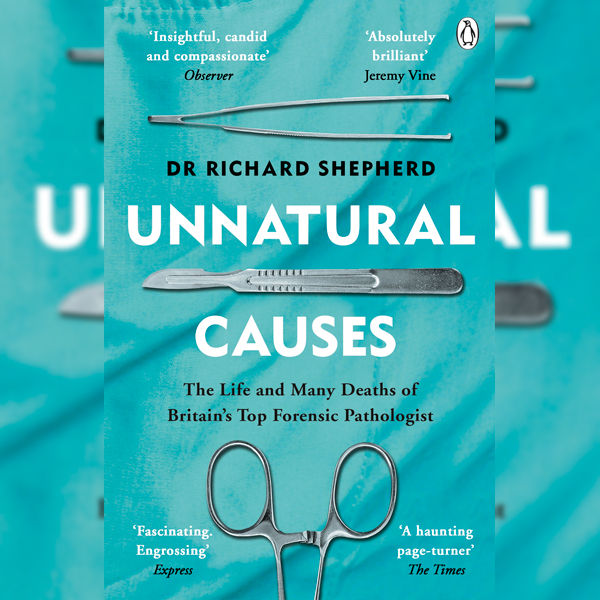'Unnatural Causes' by Richard Shepherd
- audreylinton

- Feb 24, 2020
- 3 min read
Dr Richard Shepherd has performed over 23,000 autopsies, as well as some of the most well-known cases in modern history – the death of Princess Diana, 9/11, and 7/7 London bombings. Yet all his brilliant work and discoveries came with an enormous personal cost. His desire to discover the truth in every dead body means that he is unable to face his own. In Unnatural Causes, Dr Shepherd sheds light on life as a forensic pathologist and his gruelling work facing death every day.

I wasn’t really sure what I expected from this book when I first picked it up. From the blurb, I thought it was going to be an in-depth review of Dr Richard Shepherd’s cases and his life as one of the UK’s top forensic pathologists. This is partly what the book is about, but it’s much more autobiographical than I originally expected, which might sound stupid, seeing as this is an autobiography. If I’m being completely honest, when I read the first chapter, where Dr Shepherd recounts flying over Hungerford, I started to think that maybe this isn’t really my thing. However, I’d seen really good reviews of Unnatural Causes, so I decided to keep reading.
Once you’ve read the entire book, the earlier chapters make a lot more sense. Shepherd intertwines stories from his childhood and early adult life to show his journey into pathology, and how this later impacts his relationship with the profession. Dr Shepherd has had an incredible career, and it’s really interesting to see how he explains his seemingly gruesome job in such an ordinary way. As someone who knows very little about forensic pathology (apart from the occasional DNA testing on crime shows), it was fascinating to see the evolution of this profession during the 1980s and 1990s.
Richard Shepherd also sheds light on the moral challenges these professionals face in their day to day work, as if seeing dead bodies every day isn’t hard enough. Shepherd’s work involved a mixture of both natural and unnatural cases – the ‘unnatural’ cases meant dealing with homicides or murders. This meant not only dealing with the victims, but with the perpetrators of the crimes themselves. Shepherd shares the challenges of having to treat every human body with respect during a post mortem, no matter their past history, which is something I (perhaps naively) had never even considered.
What intrigued me most about the book was the huge cases Dr Shepherd was able to work on. I won’t reveal too much as to what he says in order to not ruin the book, but he explains more about the process of dealing with mass disasters such as 9/11 and 7/7 and how different governments responded and adapted.
Probably the toughest part of being a forensic pathologist is not dealing with the dead bodies, but those who still remain alive. Victim’s families sometimes criticised pathologists for cutting up their loved one’s bodies without having the chance to say goodbye, whilst others wanted reassurance that they did not suffer during their death. Nothing can prepare you for these difficult discussions and seeing someone’s pain, which Richard explains for various cases.
Overall, I found this a really interesting read; it’s definitely a niche subject and something which I’ve never read before. Despite its sometimes descriptive autobiography narrative, everything eventually fits into place in order to provide an overview of Dr Shepherd’s life as a pathologist. If you’re looking for a different read this year, then I’d definitely recommend Unnatural Causes.
Favourite quotes:
“Shock has no place in the work of a pathologist.”
“Embarrassment is just the kind of worldly concern which I believe the dying relinquish, often perhaps with relief.”
“The purity of scientific truth rarely cuts through contemporary social attitudes.”



Comments